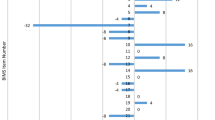Abstract
The author argues that the many recent reports on schools signify a renewed emphasis on social Darwinism. In noting that the reports are numerous and calls for reform vehement, Noblit suggests that the emerging agenda is neither starting nor new. By characterizing this reform agenda as both inappropriate and impotent, Noblit argues that the concepts of quality and excellence are misconceived, as are the means and actors needed to create excellence. Noblit concludes by developing an alternative reform agenda based on teacher professionalism and local initiative.
Similar content being viewed by others
References
Aronowitz, S. (1973).False Promises: The Shaping of American Working Class Consciousness. New York: McGraw-Hill.
Berry, B., Noblit, G., and Hare, R. (1985). The qualitative critique of teacher labor market studies.The Urban Review 17: 98–110.
D'Amico, J. (1982). Using effective schools studies to create effective schools: no recipes yet.Educational Leadership 50: 60–62.
Deal, T., and Kennedy, A. (1982).Corporate Cultures. Reading, Mass.: Addison-Wesley.
Edmonds, R. (1979). Effective schools for the urban poor.Educational Leadership 37: 15–24.
Edson, C. (1983). Risking the nation: Historical dimension on survival and educational reform.Issues in Education 1: 171–184.
Firestone, W., and Herriott, R. (1982). Prescriptions for effective elementary schools don't fit secondary schools.Educational Leadership 51–53.
Forester, J. (1981). Questioning and organizing attention.Administration and Society 13: 161–205.
Gage, N. (1984). What do we know about teaching effectiveness.Phi Delta Kappan 66: 87–93.
Gallup, G. (1984). The sixteenth annual Gallup Poll of the public's attitudes toward the public schools.Phi Delta Kappan 66: 23–38.
Goodlad, J. (1984).A Place Called School. New York: McGraw-Hill.
Husen, T. (1983). Are standards in U.S. schools really lagging behind those in other countries?Phi Delta Kappan 64: 455–461.
Katz, D., and Kahn, R. (1978).The Social Psychology of Organizations. New York: Wiley.
Lipsky, M. (1980).Street-Level Bureaucracy. New York: Russel Sage Foundation.
Meyer, J., and Rowan, B. (1978). The structure of educational organizations. In M. Meyer et al. (eds.),Environments and Organizations. San Francisco: Jossey-Bass.
Meyer, M., et al (eds.) (1978).Environments and Organizations. San Francisco: Jossey-Bass.
Mills, C. (1956).The Power Elite. New York: Oxford University Press.
Nisbet, R., and Perrin, R. (1977).The Social Bond. New York: Knopf.
Noblit, G., and Johnston, B., eds. (1982).The School Principal and Desegregation. Springfield, IL: Charles Thomas.
Noblit, G. (in press). Ideological purity and variety in effective middle schools. In G. Noblit and W. Pink (eds.),The Social Context of Schooling: Qualitative Studies. Norwood, N.J.: Albex.
Perrow, C. (1970).Organizational Analysis: A Sociological View. Belmont, Calif.: Wadsworth.
Peters, T., and Waterman, R. (1982).In Search of Excellence. New York: Harper and Row.
Pirsig, R. (1974).Zen and the Art of Motorcycle Maintenance. New York: William Morrow.
Rothschild-Whitt, J. (1979). The collectivist organization: An alternative to rational-bureaucratic models.American Sociological Review 44: 509–527.
Schlechty, P., and Noblit, G. (1985) Using a focus on new teachers to develop experienced staff. A paper prepared for the Rand Corporation, Washington, D.C.
Shapiro, S. (1984). Choosing our educational legacy: Disempowerment or emancipation.Issues in Education 2: 11–22.
Spring, J. (1980).Educating the Worker-Citizen. New York: Longman.
Warren-Little, J. (1981).School Success and Staff Development. Boulder, Colo.: Center for Action Research.
Weick, K. (1982). Administering education in loosely coupled systems.Phi Delta Kappan 69: 673–676.
Author information
Authors and Affiliations
Additional information
This article is a revised version of a paper prepared for the American Educational Studies Association Annual Meeting, Atlanta, November 1985.
Rights and permissions
About this article
Cite this article
Noblit, G.W. What's missing from the national agenda for school reform? Teacher professionalism and local initiative. Urban Rev 18, 40–51 (1986). https://doi.org/10.1007/BF01112122
Issue Date:
DOI: https://doi.org/10.1007/BF01112122




